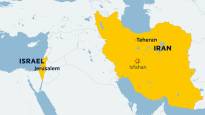The Israeli administration has been the target of cross pressures when planning the attack, assesses Lieutenant Colonel Juha Mäkelä from the Defense Forces Research Institute.
Israel’s attack on Iran is like a surgical precision strike, describes the Department Head of the Defense Forces Research Institute, Lt. Col. Juha Mäkelä.
– The choice of targets indicates that the attack probably wanted to avoid civilian casualties. It was done in remote production facilities and cities and large population centers were avoided.
Israel struck the province of Isfahan, where a strategically important nuclear research facility for Iran and a major air base are located.
Mäkelä states that the administration in Israel has had both political and public pressure to respond to Iran’s large-scale attack last weekend. At the same time, the United States in particular has urged Israel to avoid a counterattack.
– Maybe then the pressure from the United States has caused the desire to strike, but a small surgical strike with precision weapons was carried out.
According to the latest information, Israel attacked Iran “only” with three drones or missiles. Iran, on the other hand, attacked Israel with more than 300 missiles and drones less than a week ago.
– Israel has certainly calculated that the risk of escalation is the lowest with such an attack, Mäkelä estimates.
He says that the strikes have equally affected Iran’s strategic targets.
The attacks on Syria fit the picture
In addition to Iran, two targets in Syria were also struck at night. The perpetrator has not been identified, but it would fit the picture that the attacks were carried out by Israel.
Units of Iran’s Revolutionary Guard and terrorist cells supported by Iran operate in Syria. Mäkelä considers it possible that Israel is behind the attacks.
– Those specific targets in Syria have been considered to be where Israel could direct a retaliatory strike.
Will the cycle of revenge continue?
However, according to Mäkelä, the threat of a wider conflict in the Middle East is low. By limiting its attack, Israel is probably trying to avoid escalation.
– That it would not force Iran again to continue and make the next attack in this cycle of revenge.
The series of latest attacks began when Israel attacked the premises of the Iranian Revolutionary Guard in Damascus, Syria, with missiles at the beginning of April. Iran’s major attack on Israel was in retaliation for this.
– After that missile attack, Iran announced through its UN delegation that they now consider the matter to be finished, says Mäkelä.
Iran has not yet heard the administration’s official reaction to the Israeli attack. The threat of reciprocal revenge attacks is of course present, but Mäkelä considers it quite possible that there will not be another attack.
In recent history, there has been at least no direct response from Iran, when Israel has previously struck, for example, Iran’s nuclear production facilities.
The ball is now all in Iran’s court, says Mäkelä.
– Then we will see if they still think that this needs to be answered or if this situation will calm down for a while.
